California’s Weird Election Laws
The Top Two system has created perverse incentives.
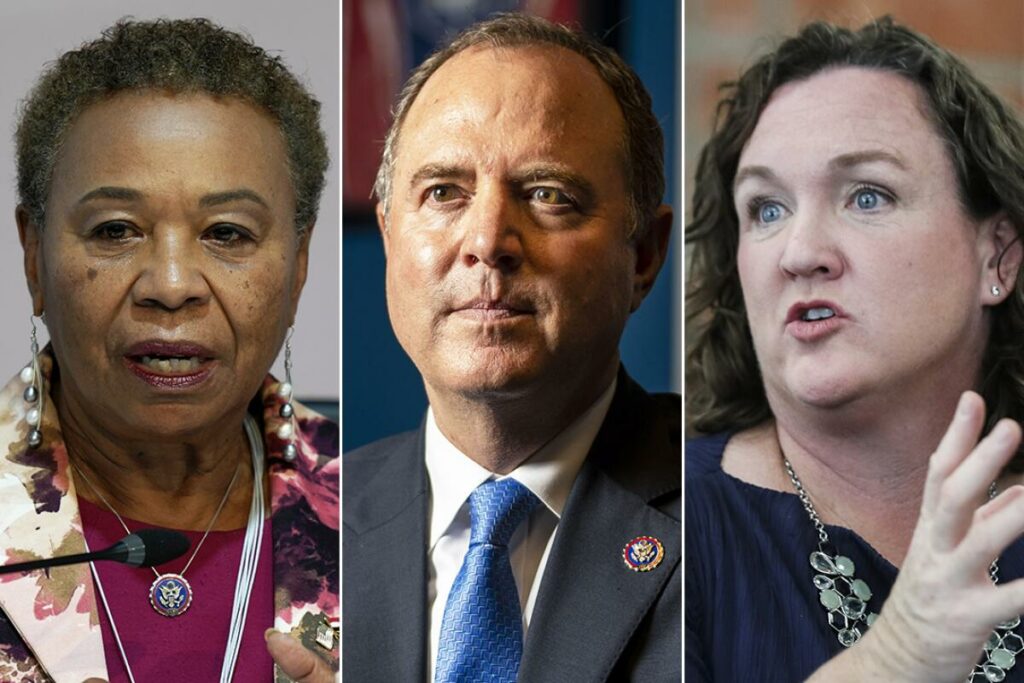
WaPo’s Karen Tumulty examines “How Adam Schiff threw a curveball into California’s Senate race.”
If you are anywhere in the vicinity of a television in California, it is hard to miss the ads being run by Rep. Adam Schiff, the Democratic front-runner in the March 5 primary to fill the Senate seat of the late Dianne Feinstein. They warn, as one puts it, that someone in the race is “too conservative for California.”
Those spots — on which Schiff’s campaign has spent close to $5 million, according to media tracking firm AdImpact — are pretty much the best thing that political novice Steve Garvey has going for him. They aim not to quash support for Schiff’s only significant GOP opponent but to gin it up in right-leaning corners of the state.
No one thinks Garvey, mostly remembered for his decades-ago career as a first baseman for the Los Angeles Dodgers and San Diego Padres, has much of a chance of actually getting elected in a state where Democrats outnumber Republicans by nearly 2 to 1. And the truth is, Garvey is barely bothering to campaign. (The subject line of one of his recent fundraising emails was: “Remember the 70’s?”)
So why the curveball commercials?
Schiff’s ads are lifting Garvey’s poll numbers, possibly enough to get him onto the November ballot under California’s unusual primary system, in which the top two finishers, regardless of party, will advance. There are more than two dozen contenders in the primary. Some of the latest polling shows Garvey moving into second place, past Democrats Katie Porter and Barbara Lee, both of whom are members of Congress.
Porter, a darling of the activist left, is calling foul. (This will be the last lame baseball pun I use in this column, I promise.) Were she to come in second, Schiff might actually havea competitive race in the fall.
Schiff’s tactic,as cynical as it is, is becoming common in California and elsewhere. What’s more, Porter began running digital ads touting another Republican, attorney Eric Early, a perennial candidate polling at slightly more than 2 percent, as “the real Republican threat in the California Senate race.” She hopes Early will cut into Garvey’s vote.
I’ve written before about Democratic candidates spending money to bolster the campaigns of radical Republicans in order to influence GOP primary voters to give themselves a more beatable general election opponent. I consider it an odious practice.
Not only is it unsporting to interfere with another party’s election but it’s bad for our national politics. First, it has the potential of backfiring. Since our elections tend to be binary contests between Democrats and Republicans, it could well result in the election of a radical Republican. Second, it further reduces comity and the chances of cooperation since it targets precisely those Republican candidates who are most likely to cooperate with Democrats in governing.
California’s Top Two system further incentivizes the practice. Because it’s a heavily Democratic state, it was intended to generally give voters a choice between the two most popular Democrats running for a given office. But, since there are generally more Democratic than Republican candidates in the race, there’s good reason to do what Schiff is doing. And, indeed, he’s not alone: it’s an increasingly widespread practice. Rob Bonta employed it in his 2022 race for re-election as attorney general. Gavin Newsom used it in his 2018 and 2022 races.
Now, in fairness, there is mounting evidence that, after a very slow start, the system is starting to have the desired impact.
Even notable scholars in the democracy reform field were initially skeptical that Top Two would make much of an impact, let alone make California less polarized. But it’s important to think back to where California was when Top Two was just getting underway. California’s Legislature was ranked at the time as the most polarized in the nation. And not by a sliver, either. In fact, the gap between California and the second-most-polarized state at the time, Colorado, was larger than the gap between any other consecutively ranked states.
So given how polarized California was, it’s unreasonable to expect Top Two to have immediately turned the state into a beacon of moderation and civility. The evidence we’re after is not that Top Two has been a near-overnight panacea but rather that it has brought about incremental but measurable progress on depolarizing the state. By this standard, the system is working.
Between 2013 and 2018, California’s state legislature was one of only five in the country that became less polarized. In fact, since California implemented its Top Two system only Kansas and West Virginia depolarized more. Meanwhile, polarization increased in the vast majority of states — 38 out of 50 — during this period.
California’s performance under Top Two is even more impressive when judged against other states in the West, which have polarized more than those in any other region. From 2013 to 2018, the four states where polarization increased the most were Arizona, Colorado, Oregon and Utah. Thanks to Top Two, California is trending in the opposite direction.
Top Two is also substantially lowering extremism among members of Congress from California. Again, the debt ceiling vote is a compelling recent example. All 12 Republican members from California voted for the bipartisan deal to avoid default.
To be fair to critics, early data did tell a different story. In 2014, research showed that Top Two had had no meaningful effect on elected officials’ behavior. However, University of Southern California political scientist Christian Grose analyzed data up to 2018, allowing for more time to observe potential effects of the reform. Grose found that legislators elected under Top Two were almost 20 percent less ideologically extreme than legislators elected in closed primaries. Consistent with this trend, Eric McGhee, a political scientist at the Public Policy Institute of California, found that Top Two had led Democrats to create a friendlier business environment by reducing regulatory barriers.
For years, former California Gov. Arnold Schwarzenegger and other electoral reform advocates have argued that Top Two would reduce ideological extremism and polarization in government. While many Californians are understandably frustrated by continued acrimony and extremism in the state, the Top Two primary system has California moving in the right direction — at a time when most of the country is not. The state was deep in the well of polarization but is making progress.
So, it may be that the boosting of extremist candidates as a cynical tactic is an outlier. Still, while reducing polarization is a reasonable societal goal, it’s clearly not in the interest of some of the candidates. For Newsom, Schiff, and others, it’s much better to run against an extreme candidate than a more appealing one.

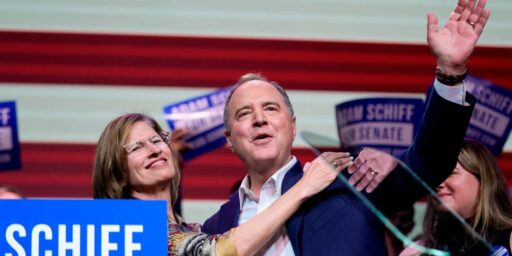
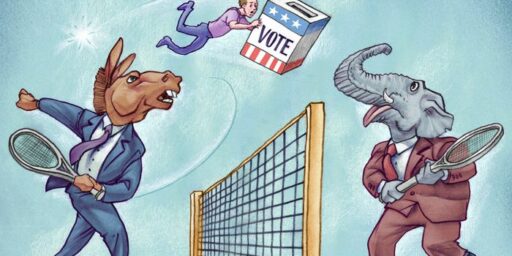
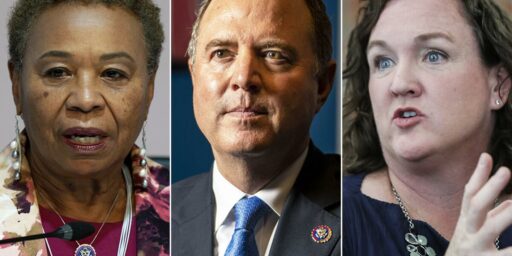
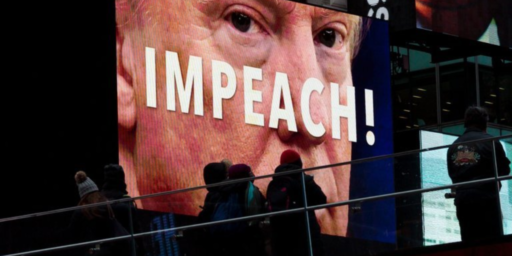
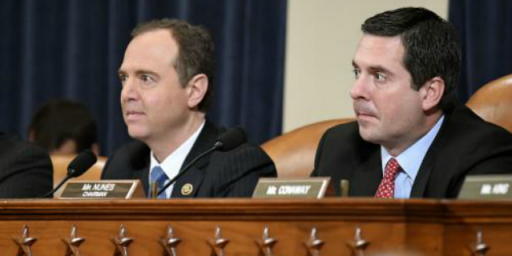
Clearly it’s in Schiff’s interests for Garvey to come in second. But what would be best for the Democratic Party? I’ve heard two conflicting theories:
(1) If it’s Schiff vs. Porter, Dems will spend a ton of money on the race, diverting them from more important contests around the country.
(2) If it’s Schiff vs. Porter, it will boost Democratic turnout in the normally uncompetitive state, helping the party downballot, particularly in crucial House races that could decide control of the chamber.
I lean toward the second theory.
Rep Schiff’s ads seem a natural outcome of the R party’s growing radicalization and I have thought Napoleon’s advise applied — not interrupting your enemy while he is making a mistake.
Kathy’s First Law: There are downsides to everything.
That shouldn’t be a negative (I’m talking about using “unsporting” as a negative, not the practice itself). A good part of our political problems exist because people can’t separate politics from sports – sometimes literally in Tommy Tuberville’s case.
As for the supposed effect of Top Two, my impression is that the reason California is less polarized is because a single party, the Democrats, have come to dominate. It seems unlikely that the reason for that is because of Top Two. Much more likely is simply that crazy nutballs have taken over the Republican Party and have driven so much of the electorate away.
I was about to comment that politics isn’t beanball. Then it occurred to me that I wasn’t entirely sure what sort of genteel sport beanball was. On looking it up, all I find is the baseball meaning of a pitch intended to injure the batter. But also the traditional phrase is actually “beanbag”. So politics is beanball but not beanbag. Semantics, how does that work?
I live in California, and I haven’t seen this ad, though I’ve seen tons of ads from Schiff.
But let me get this straight,
1. The ad he’s running says Steve Garvey is “too conservative for California”
1a. No, the ad doesn’t mention Garvey by name, just as “somebody”
2. This ad, some people think, has boosted Garvey’s numbers. Something has boosted Garvey’s numbers.
That’s not much of a foul. (I think that works more like a basketball reference than a baseball one. A foul ball in baseball is just something that’s off course and has no consequence.)
It’s a little goofy if saying another candidate is “too conservative” makes some people want to vote for him more.
Gray Davis did something like this for his gubenatorial re-election, and got a very conservative opponent. He won easily, and then got recalled. Because, in my opinion, he did not have much in the way of positive ID with the voters. Senators can’t be recalled, and Adam Schiff is making sure voters know who he is.
@gVOR10: All I can say is that the candidate who wins will be the one who rope-a-dopes a hail mary pass while throwing a curveball to get the big mo.
@MarkedMan:
You mean in fact “a good part of our problems are that humans are humans and not Left intellectual abstractions behaving the way educated elites think people should behave.”
“The Top Two system has created perverse incentives.”
While arguably true, like everything else in life, there are always tradeoffs. What’s important is how the perverse incentives compare to the perverse incentives of the available alternatives which, for a standard system that most of the country uses, are arguably worse.
I’m not completely sold on Top Two, but I’m glad that California is running the experiment. And I’d say that, so far, it is a better alternative for places dominated by a single-party compared to the standard system where elections are de facto decided in a plurality-winner primary.
To sum up the summary of the summary, people are a problem.
@Andy: What he said.
There is no perfect electoral system, perfect form of goverment, perfect economic system, parenting style, foreign policy, presidential candidate, judicial philosophy, position on Israel/Palestine etc etc etc. They all got pros, they all got cons. So me make trade-offs.
In this case, as noted, seems the depolaruzation pros of top two may outweigh the odious “perverse incentive” cons. It is what it is.
What’s the theory for nefarious behavior here? If Schiff were promoting Garvey, that would be truly cynical and maybe Schiff is being presumptuous about being one of the Top Two. But it strikes me as better from a Democratic (and democratic) perspective for Schiff to establish early on that Garvey isn’t a good ideological fit for California than it would be for him to bash Porter or Lee now. Garvey has name recognition – something highly valuable in a primary – that Porter and Lee don’t have.
If Garvey were to manage to pull off a Top Two finish in the primary, then it was campaign money well spent for Dems, even if Porter or Lee beat out Schiff for the other spot. If Garvey ends up in third, then the intra-party opposition advertising will come soon enough.
@DK:
“There is no perfect electoral system”
That’s heresy around here.
@Moosebreath: Gee, I dunno, but I think your comment is besmirching both our hosts and the participants in the discussions pretty unfairly. Certainly, no system is going to be better than the people using it, but I don’t even find anyone here disagreeing with that point to any degree.
Perhaps you would care to elaborate on your heresy accusation. (Or my snark detector/your SnarkMaster 500B is broken.)
@Just nutha ignint cracker:
“Perhaps you would care to elaborate on your heresy accusation. (Or my snark detector/your SnarkMaster 500B is broken.)”
It was intended as snark, as exaggerating Dr. Taylor’s position to saying that changing to proportional representation cures all ills.
Comment withdrawn.
@Moosebreath: While I find Dr. Taylor’s abstract theoretician approach somewhat sterile, this is a gross mischaracterisation / misunderstanding of is position and arguments (and to the extent it is not a mischaracterising combined with misunderstanding, it is as well a gross exaggeration, “cure all ills” – rather address certain structural issues).
If one wishes to take a shot at hiim, it’s rather more well-founded to note that it is rather tending to the sterile and pointless if one is not able to point to a practical, actionable path “there from here” (beyond the theoretician’s educating).
Of course since even to this audience it seems a large percent are not really following him, perhaps the ongoing education effort. Althouh practicable near-term would in my mind be more practical.
In any case, his comment and analysis are certainly less sterile although not as emotionally self-satisfying than the various self-congratulatory forms of “the Opposition are evil doody-heads, and we are so much the Good guys, yay us, boo them”
@DK:
This is 100% true.
But it is also true that Top Two is nowhere close to the best we could be doing.
In regards to the rest, I take no offense at the initial comment.
I will note that the fact that Top Two seems like some truly significant experiment/reform shows how little we in the US understand the options.
It is tinkering on the margins and I suspect that at least some of the depolarization noted in the OP is simply the result of districts becoming most intraparty contests. I mean, if it is D v. D or R v. R I guess you have fixed polarization.
Just a small point: this type of maneuver has been used in conventional primaries and also has been used in conventional runoff systems(It’s one of the reasons why some weird, relatively small party politicians can get elected President in Latin America). If there are two days where people cast their ballots you’ll see candidates trying to choose their opponent in the second day of voting. And even IRV or proportional elections can have these type of maneuvers(Like, when political parties only run a very limited number of candidates in a proportional election).